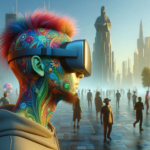The internet is on the cusp of a paradigm shift. The buzzwords “Metaverse” and “Web3” are igniting discussions about a more immersive, decentralized, and user-centric online experience. But what exactly are these trends, and what do they hold for the future?
The Metaverse: A World of Endless Possibilities
Imagine a network of interconnected virtual worlds where you can work, play, socialize, and even own digital assets. That’s the essence of the Metaverse. It leverages technologies like virtual reality (VR), augmented reality (AR), and blockchain to create a persistent, 3D virtual space accessible through avatars.
The Rise and Fall: Hype vs Reality
The Metaverse is still in its nascent stages. While tech giants like Meta (formerly Facebook) are pouring resources into its development, challenges remain. Issues like hardware affordability, accessibility, and content creation pose hurdles to widespread adoption. There have also been concerns about privacy, security, and potential social isolation in these immersive environments.
The Future Beckons: Business Opportunities Abound
Despite the challenges, the Metaverse presents exciting business opportunities. Here are a few examples:
- Virtual Workspaces: Imagine attending meetings or collaborating with colleagues in a virtual conference room.
- E-commerce: Businesses can create immersive shopping experiences where customers can virtually try on clothes or explore products in 3D.
- Education and Training: Educational institutions can offer interactive virtual learning environments.
- Entertainment: The Metaverse opens doors for interactive concerts, virtual tours, and immersive gaming experiences.
Startups: Boom and Bust
The Metaverse and Web3 space have seen a flurry of startup activity. However, it’s not without its share of failures. Some startups have struggled to gain traction due to technical limitations, a lack of user adoption, or overhyped promises.
Success Stories: Pioneering the Future
On the other hand, several startups are making waves. Here are some examples:
- The Sandbox: A gaming platform where users can create, own, and monetize virtual experiences.
- Decentraland: A virtual world built on blockchain technology where users can buy and sell virtual land.
- Roblox: A popular online game platform with a thriving virtual world where users can interact and create content.
Web3: Decentralization Takes Center Stage
Web3 is another crucial piece of the puzzle. It refers to a vision of a future internet that is decentralized, user-owned, and built on blockchain technology. This would shift power away from large corporations and towards individual users.
The Future of Web3: Fostering Innovation and Ownership
Web3 holds the potential to revolutionize various aspects of the internet, including:
- Data Ownership: Users could have greater control over their online data and how it’s used.
- Content Monetization: Creators could have more direct ways to monetize their content without relying on platforms.
- Financial Services: Decentralized finance (DeFi) could provide new financial tools and services not reliant on traditional institutions.
The Road Ahead: Collaboration is Key
The Metaverse and Web3 are complex concepts with a long way to go. Collaboration between tech companies, policymakers, and users will be crucial for their responsible development. As we navigate this exciting yet uncharted territory, the focus must remain on creating a future internet that is inclusive, equitable, and benefits all users.












